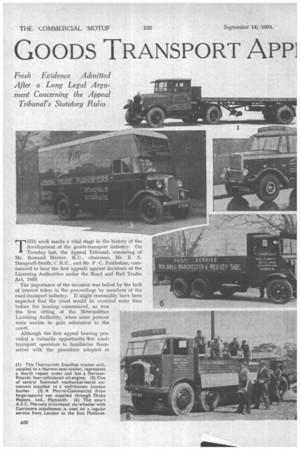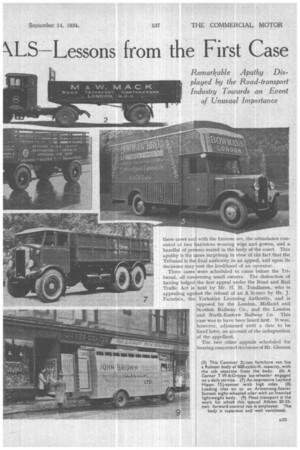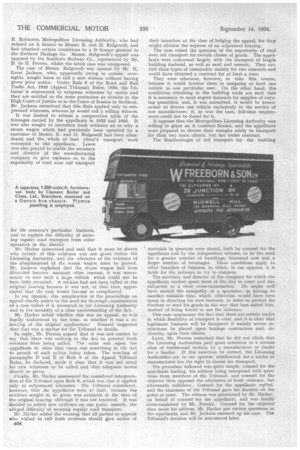GOODS TRANSPORT APR
Page 42

Page 43

Page 44

If you've noticed an error in this article please click here to report it so we can fix it.
%L5—Lessons from the First Case T.HIS week marks a vital stage in the history of the development of the goods-transport industry. On Tuesday last, the Appeal Tribunal, consisting of Mr. Rowand Harker. KC., chairman, Mr. E. S. Shrapnell-Smith, C.B.E., and Mr. F. C. Fairholme, commenced to hear the first appeals against decisions of the Licensing Authorities under the Road and Rail Traffic 'Act, 1933.
The importance of the occasion was belied by the lack of interest taken in the proceedings by members of the road-transport industry. It might reasonably have been expected that the court would be crowded some time before the hearing commenced, as was the first sitting of the Metropolitan Licensing Authority, when some persons were unable to gain admission to the court.
Although the first appeal hearing provided a valuable opportunity Wfor roadtransport operators to familiarize themselves with the procedure adopted in these cases and with the forensic art, the attendance consisted of two banisters wearing wigs and gowns, and a handful of persons seated in the body of the court. This apathy is the more surprising in view of the fact that the Tribunal is the final authority in an appeal, and upon its decisions may rest the livelihood of an operator.
Three cases were scheduled to come before the Tribunal, all concerning small owners. The distinction of having lodged the first appeal under the Road and Rail Traffic Act is held by Mr. H. H. Tomlinson, who is appealing against the refusal of an A licence by Mr. J. FarndaIe., the Yorkshire Licensing Authority, and is opposed by the London, Midland and Scottish Railway Co., and the London and North-Eastern Railway Co. This case was to have been heard first. It was, however, adjourned until a date to be fixed later, on account of the indisposition of the appellant.
The two other appeals scheduled for hearing concerned decisions of Mr. Gleeson
E. Robinson, Metropolitan Licensing Authority, nho had refused an A licence to Messrs. E. and H. Ridgewell, and had attached certain conditions to a B licence granted to the Ewhurst Haulage Co. Messrs. Ridgewell's appeal was opposed by the Southern Railway Co., represented by Mr. B. de H. Pereira, whilst the latter case was unopposed. The case of Messrs. Ridgewell was opened by Mr. K. Greer Jackson, who, apparently owing to certain oversights, sought leave to call a new witness without having giveri prior notice. Under Rule 9 of the Road and Rail Traffic Act, 1933 (Appeal Tribunal) Rules, 1934, the Tribunal is empowered to subpcena witnesses by notice and they are entitled to the same protection as obtains in the High Court of Justice or in the Court of Session in Scotland. Mr. Jackson submitted that this Rule applied only to subpcenaed witnesses, whereas he would call a willing witness.
It was desired to submit a comparative table • of the tonnages carried by the appellants in 1933 and 1934. It was also sought to introduce fresh evidence as to why a steam wagon which had previously been operated by a customer of Messrs. E. and H. Ridgewell had been abandoned and the whole of that client's transport work entrusted to the afipellants. Leave was also prayed to enable the secretary and director of the manufacturing company to give e-vidence as to the superiority of road over rail transport for his concern's particular business, and to explain the difficulty of securing regular road transport from other operators in the district.
Mr. Harker intervened and said that it must be shown why certain of this evidence was not given before the Licensing Authority, and the relevance of the evidence of the abandonment of. the steam wagon must be proved. Mr. Jackson explained that the steam wagon had been discarded because amongst othei reasons, it was uneconomic to own such a large vehicle which could not be kept fully occupied. A witness had not been called at the original .hearing because it was not, at that time, appreciated that the case would become so complicated.
In om opinion, this romplication of the proceedings on appeal clearly Doins to the need for thorongli consideration of a case before it it presented to the Licensing Authority and to the necessity of a clear understanding of the Act.
Mr. Harker asked whether this was an appeal, as w.ss legally understood b the term. or whether it was a re
hearing of the original application? Counsel suggested that that was a matter for the Tribunal to decide.
In reply, Mr. Pereira argued that it was not correct to say that there was nothing in the Act to prevent fresh evidence, from being called. The onus was upon the appellants to show that there was something in the Act to permit of such action being taken. The wording of paragraphs D and E of Rule 9 of the Appeal Tribunal Rules, he declared, made it clear that it was not usual for new witnesses to be called and that adequate notice should be given.
Finally, Mr. Harker announced the considered interpretation of the Tribunal upon Rule 9, which was that it applied only to subpoenaed witnesses, The ribunal considered, however, that the appellants were at /atilt, because the evidence sought to he given was available at the time of the original hearing although it was not tendered. It was decided to admit new evidence on one point, namely, the alleged difficulty of securing regular road transport
Mr. Harker added the warning that all parties to appeals who wished to call fresh evidence should give notice of B.34 their intention at the time of lodging the appeal, for they might obviate the expense of an adjourned hearing., The case raised the question of the superiority of road over rail transport for certain classes of goods. The appellants were concerned largely with the transport of fragile building material, as well as sand and cement. They carried these types of commodity mainly for two concerns and could have obtained a contract for at least a year.
They were reluctant, however, to take this course, because it would involve them in assigning at least one Vehicle to one particular user. On the other hand, the conditions obtaining in the building trade are such that it is necessary to meet urgent demands for supplies of varying quantities, and, it was submitted, it would be uneconomic to devote one vehicle exclusively to the service of one manufacturer, if, as was the case, full-time employment could not be found for it.
It appears that the Metropolitan Licensing Authority was willing to grant an A contract licence, and the appellants were prepared to devote their energies solely to transport for their two main clients, but not under contract.
The disadvantages of rail transport for the building materials in question were stated, both by counsel for the appellants and by the independent witness, to be the need for a greater number of handlings, increased cost and a larger number of breakages. These conditions apply to other branches of business, in which, in our opinion, it is futile for the railways to try to compete.
The secretary and director of the company for which the appellants worked spent most of the day in court and was _ subjected to a close cross-examination. He might Well have earned the sympathy of a spectator, in having to sacrifice valuable time, which, otherwise, would have been spent in directing his own business, in order to protect his freedom to send his goods in the way that best suited him, instead of being forced to use the railways.
This case emphasizes the fact that there are certain trades in which flexibility of transport is vital, and it is clear that legitimate business will be hampered if unduly severe restrictions be placed upon haulage contractors and, indirectly, upon their clients.
Later, Mr. Pereira remarked that he did not think that the Licensing Authorities paid great attention to a certain class of testimonial written by a manufacturer or trader for a haulier. If this assertion be correct, the Licensing Authorities are, in our opinion, misdirected, for a trader or manufacturer has the right to choose his transport
The procedure followed was quite simple, counsel for the appellants leading, his address being interposed with questions from members of the Tribunal, and counsel for the objector then opposed the admission of fresh evidence, but afterwards withdrew. Counsel for the appellants replied, and the chairman of the Tribunal gave his decision on the point at issue. The witness was questioned by Mr. Harker, on behalf of counsel for the appellants, and was finally cross-examined by Mr. .Pereira. Counsel for the objector. then made his address, Mr. Harker put certain questions to the appellants, and Mr. Jackson summed up his case. The Tribunal's decision will be announced later.




















































































